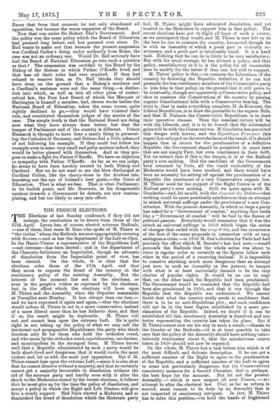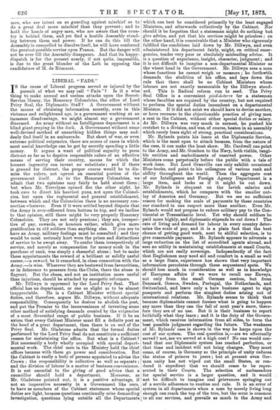THE FRENCH ELECTIONS.
THE Elections of last Sunday confirmed, if they did not enlarge, the conclusions to be drawn from those of the 27th April. Lyons has, of course, elected extreme Radicals, —one of them, that same M. Banc who spoke of M. Thiers as "the victim" whom the Radicals are now appropriately covering with flowers,—and so has the department of the Loir-et-Cher. In the Haute-Vienne a representative of the Republican Left —not extreme—has been elected ; and in the department of the Charente-Inferieure, an Imperialist, though an advocate of dissolution from the Imperialist point of view, has
been elected. On the whole, it is clear that the elections echo those of the 27th April, and that they mean to express the dread of the country at the reactionary policy of the existing Assembly. But the interest of the moment lies not in the elections, or even in the people's wishes as expressed by the elections, but in the effect which the elections will have upon M. Thiers and the Assembly, when the Deputies reassemble at Versailles next Monday. It has always been our fear,— and we have expressed it again and again,—that the elections would induce M. Thiers to act in a more conservative, instead of a more liberal sense than he has hitherto done, and that if so, the result might be deplorable. M. Thiers will not and cannot lean upon the extreme Left. He is quite right in not taking up the policy of what we may call the intolerant and propagandist Republicans, the party who think freedom only fit for those who hold the orthodox creed, and who mean by the orthodox creed, republicanism, secularism, and municipalism in the strongest form. M. Thiers knows well that a Republic administered by such a party would be both short-lived and dangerous, that it would excite the most violent and, let us add, the most just opposition. But if M. Thiers cannot lean upon the extreme Left,—since it is also clear that he cannot dissolve without a majority, and that he certainly cannot get a majority favourable to dissolution without the aid of the extreme party and hardly even with it after the shock to the Moderates caused by the recent elections, it follows that he must give up for the time the policy of dissolution, and accept a policy in which the Right and Left Centres will give him a steady support. Had Paris elected a Moderate, and so diminished the dread of dissolution which the Moderate party , feel, M. Thiers might have advocated dissolution, and yet trusted to the Moderates to support him in that policy. The recent elections have put to flight all hope of such a ccurse, as we anticipated they would, and M. Thiers is now left to do the best he can to reassure the country, hampered though he is with an Assembly of which a great part is violently re- actionary, and a great part is intolerably timid. It is a hard task. Nothing that he can do is likely to be very satisfactory. But with his usual courage, he has devised a policy, and that policy, unsatisfactory as it is, is the policy for all reasonable men to modify for the better if they can, but still to support. M. Thiers' policy is this,—to reassure the Liberalism of the country by declaring the Republic definitive, if he can but persuade the less reactionary members of the Conservative party to join him in that policy, on the ground that it will prove to be eventually, though not apparently, a Conservative policy, and then to reassure the Conservatism of the country by passing organic Constitutional bills with a Conservative bearing. The story is, that to make everything complete, M. de Remusat, the Liberal Republican, is to draw the preamble to the organic Bills, and that M. Dufaure, the Conservative Republican, is to draw their operative clauses. Thus the nominal victory will be with the Liberals, and, it is to be feared, that the substantial gains will be with the Conservatives. M. Gambetta has perceived this danger with horror, and the Re'publique Francaise (his organ) has enlarged on the wretchedness of the result, if it should happen that in return for the proclamation of a definitive Republic, the Government should be permitted to enact laws that are not simply Tory, but even reactionary in their drift.
Yet we submit that if this is the danger, it is of the Radical party's own making. Had the candidate of the Government been returned by Paris, all the timid excitability of the Moderates would have been soothed, and there would have been no necessity for setting off against the proclamation of a Republic the enactment of a very Conservative organic law.
M. Thiers' need for the support of the Right Centre is of the Radical party's own making. ' Still, we quite agree with M.
Gambetta—and, let us add, with the Journal des Debats—that
nothing could be more practically mischievous than an attempt to attack universal suffrage under the provisions of a new Con- stitution. With the present Assembly, in which so large a party has asked for a " Government of combat," anything that looks like a " Government of combat " will be fuel to the flames of political passion. Everybody would remember that it was the attack on universal suffrage in 1850 which began the series of changes that ended with the coup d'dat, and the recurrence of the first of the same proposals in connection with so very analogous a crisis,—in 1850 M. Sue's election for Paris had had precisely the effect which M. Barodet's has had now,—would persuade the Radicals that the whole series was about to recur in regular order as certainly as the figures follow each other in the period of a recurring decimal. It is impossible to conceive anything much more dangerous than an attempt just now, in such an Assembly as the present, to tamper with what is at least universally deemed to be the very charter of popular rights. It would be no use to urge that, on the other hand, the Republic had been proclaimed. The Government would be reminded that the Republic had been also proclaimed in 1850, and that it was through the Republic that the Republic was undermined. We cannot doubt that what the country really needs is confidence that there is to be no anti-Republican plot ; and such confidence will not be in the least degree established by a mere pro- clamation of the Republic. Indeed, we doubt if it can be established till this reactionary Assembly is dissolved and one better representing the country has taken its place. But if M. Thiers cannot now see his way to such a result,—thanks to the blunder of the Radicals,—it is at least possible to take care that the policy of the Assembly should have nothing osten- tatiously reactionary about it, that the mischievous course taken in 1850 should not now be repeated.
On the whole, M. Thiers has a task before him which is of the most difficult and delicate description. If he can get a sufficient number of the Right to agree to the proclamation of the Republic, and a sufficient number of the Left to agree to some not particularly dangerous, but (to Conservatives) consolatory measure for a Second Chamber, that is, perhaps, the best hope for the moment. But let not the present Assembly, — which is now suspect all over France, — at- attempt to alter the electoral law. That, so far as reform is needed, must remain to be done by an Assembly that is not suspected of reactionary intrigues. In fact, M. Thiers has to solve this problem,—to hold the hands of frightened men, who are intent on so guarding against mischief as to do a great deal more mischief than they prevent ; and to hold the hands of angry men, who are aware that the coun- try is behind them, and yet find a hostile Assembly stand- ing between them and power. If he can do this till the Assembly is compelled to dissolve itself, he will have conferred the greatest possible service upon France. But the danger will not be over till the Assembly disappears. And that its happy- dispatch is for the present nearly, if not quite, impossible, is due to the great blunder of the Left in opposing the candidature of M. de Remusat.



































 Previous page
Previous page